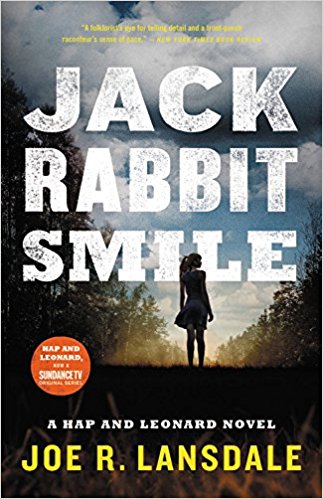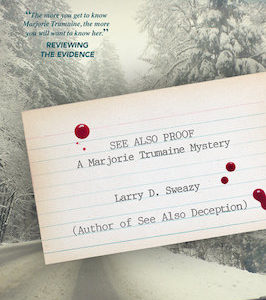With his latest novel, Jackrabbit Smile, Joe Lansdale continues with the misadventures of Hap and Leonard, an East Texas redneck liberal and his lethal black gay Republican pal. This time the two have to go back to Hap’s hometown in search of a missing girl and go up against a religion lead by a man known as “The Professor,” who’s buying up land for a white utopia. It fits into the themes of race, religion, and politics Lansdale often dives into with no fear and a ton of humor. I recently spoke with the writer about the book and these issues that drive his work.
Scott Montgomery: It seems like in the last couple of Hap and Leonards, you’ve been using the two to express your political views more.
Joe Lansdale: I think it’s always been that way from the start. Savage Season looked at the aftermath of the Vietnam War and the shift in social climate to the eighties. Mucho Mojo and Two Bear Mambo deal with racial issues. Bad Chili deals with how gays were treated, mugged, killed and what have you. Rumble Tumble may have been more of a romp and Captain’s Outrageous. Some are stronger than others with the commentary; Vanilla Ride is pretty critical of religion. I think it’s always been there, brother.
 Author Joe R. Lansdale
Author Joe R. Lansdale
Montgomery: Maybe it just seems like the times lately have been amplified enough to catch up to the series, like when Rusty Puppy came out we we’re dealing with a lot of police shootings.
Lansdale: Something like Rusty Puppy has been going on for years, it’s just that people weren’t paying attention. Part of that is because people want to believe in law and order. And I’m one of them. I think it works most of the time and I’m glad those guys are out there. Now, people are capturing things on their cell phones. All of us that grew up in the south and the big cities and well, all over the country, we know about that. Black people knew it was happening.
Also, the far right has opened up a gate for people to be racist, narrow-minded, and thoughtless with this belief that the white person is being pushed down. Which is ridiculous. Being white has never hurt me any, but I know it has hurt for black and brown people. I believe in the American dream, but it’s an opportunity, not a promise and being black or brown can get in the way of that opportunity.
When we were doing table reads and getting ready for the new season of Hap and Leonard, based on Two Bear Mambo, one of the actors asked if we could do The Klan as bad guys, wondering if they were a joke now. Then Charlottesville happened the second week of shooting. So it’s not that far away. That’s what I’ve been trying to say.
Some of the things that are broad or ridiculous are exactly on the money. Now don’t think I’m trying to say every one is a social commentary. I think they are crime novels, adventure novels, they’re exciting, but to answer the initial question, they are definitely a part of the books even if they sometimes take a back seat to the adventure aspects.
Montgomery: Do you think when you look at a subject in a genre novel it allows you to do it differently?
Lansdale: With genre you have that hard driving engine of a story to move those ideas forward. Literary fiction often tackles those subjects and genre rarely does it, but that is mainly because the idea of what genre fiction is. In the eighties, I was in a group of writers that mixed the two. A large percentage of what I write is driven by social issues.
Montgomery: What makes Hap and Leonard a good vehicle to go through these issues?
Lansdale: The characters seem simple, but they’re not. Both Michael K. Williams and James Purefoy find more layers when they’re playing them. They’re not always absolutely consistent. They’re these everyday working class guys, like I was and I still think of myself as a blue collar writer at least from a class perspective. They prove that all southerners don’t fit the stereotype and are contradictory in a lot of ways. One is black and one’s white, one is black and gay. Hap, I don’t know if he was really a hippie, works against those ideals to gets justice. I don’t think they really completely succeed. They keep trying to do the right thing and it often leads to Hap questioning his morals. And both of them have killed people and so it’s a very interesting contrast. You read about some horrible person and you think that’s someone for the devil, then you read about their circumstances then you think maybe they’re not for the devil. So they’re dealing with all that and trying to pay the bills.
Montgomery: I think what’s made them even more interesting is they’ve become more aware of their flaws.
Lansdale: I think that’s absolutely correct. Like all of us in life, we begin to recognize our faults as we get older and as time goes on we discover those flaws, you know. I look back at where I was at twenty, and when I was thirty, and forty, and in many ways I remain consistent, but I’m more aware of what’s wrong with me.
Montgomery: In Jackrabbit Smile, you tackle religion again. You’ve been public about being an atheist. What is your biggest problem with religion?
Lansdale: It’s really the hypocrisy, the fact that it is all based on contradictory material. I’m of the school that I have nothing against religion as long as it isn’t in politics or you don’t beat me over the head with it. I always believe you have the right to your religion, but I have the right not to be persecuted by it and I mean that with a small “p,” although it can be with a big “P.” I think that right now, our guy in office is the least Christian I’ve ever seen and they’re saying that’s okay because he’s for what we’re for, but they don’t forgive the other side if they’ve done something wrong.
Montgomery: During the election, you wrote a piece for the Texas Observer about Trump and the Trump voter. After a year as president do you find it difficult to write what you do with a satirical bent, when you turn on the news and it seems like it’s satire but it’s real.
“What it comes down to, unfortunately, more that issues, is what side your on. I hope we reach a point where we actually realize we have to move back from that.”Lansdale: The main point of that article was that it just wasn’t stupid rednecks that were voting for him, even though that was part of it, but it was more about taking a side, Now, I’ve pretty much been a Democrat coming out of The Civil Rights Movement, but what it comes down to, unfortunately, more that issues, is what side your on. I hope we reach a point where we actually realize we have to move back from that. Right now, it’s like a Saturday Night Live skit or even more like something from National Lampoon articles I used to read, it’s gotten so ridiculous.
Montgomery: It does seem like the right has made ignorance a virtue.
Lansdale: I was excited by life as a child of the fifties and sixties because science was taking us so many places. It was considered sacred, mainly because we dropped the bomb, and it fueled belief as well. You even look at the comics of the time like The Flash and The Hulk and they had science as part of their origin. You had John F. Kennedy pushing advancement in science and education and there was an excitement about learning. Sadly, I think that started to change in the Reagan era. And here is one of my other major problems with religion; it is static. Now you have science being questioned, when science questions itself. It embraces change. Religion told us everything, the sun and the planets revolved around the Earth. To slide back after so many years of advancement, religion has become a hole many have crawled into.
Montgomery: You’ve cited Flannery O’Connor, someone who was a believer, as an influence. How do you look at her work and take it in your direction?
Lansdale: I think she was addressing the narrow mindedness of people and that look at the south. She had views of Pentecostal and Baptist that reflected her Catholic upbringing. I don’t think she was ever trying to beat you over the head with her beliefs; she was trying to tell a story of growing up in the south with those religions. When I was a kid I wanted to be a preacher, until I read the Bible all the way through and thought this was more like mythology, but it did show me the structure of story.
Montgomery: You have books like Paradise Sky, which I wouldn’t say is religious, but it does have a biblical feel to it.
“The King James Bible still seems closer to our speech and slang, being a landlocked culture.”Lansdale: When I was growing up in the south, everyone had a King James Bible. That’s what the preacher preached from and it also influenced the music, the rhythms from the choir and all. The King James Bible still seems closer to our speech and slang, being a landlocked culture.
Montgomery: You’re big in Italy, which is a very Catholic country. When you delve into religion do they relate or see it as something exotic?
Lansdale: I have a lot of fans and readers who are Christian and they have no problem and even seek a different view from my writing. Many are what I’d refer to as cultural Christians, who it was part of their upbringing and how in their social life, but would admit their more agnostic in private. I found Italy to be a lot like that.
Montgomery: Do you still offend people with your books or do they know what they’re getting by now?
Lansdale: I still get a few people who don’t understand context. If you use the word shit, they take it like it’s coming out of my mouth and not how I may be trying to turn that word on its ear. Or people who don’t get what I’m saying about race and religion. They don’t get I’m speaking through the characters.
Montgomery: You have fun with that at times when Hap talks about how he uses the term black.
Lansdale: When I was growing up, I used to hear colored and now people think that’s terrible, but was common usage, The national Association Of Colored People, then it became black or Afro-American and now it’s African American, but I still use the term black and a lot of black people use the term black and that’s young and old. African American feels forced. It’s like I don’t refer to my Italian friends as Italian Americans or all the Irish as Irish Americans. The only reason we say Black Americans is because we have to address the situation they are currently experiencing. Anyway, the biggest problem is that we have to identify at all, but it’s impossible to get away from that because it’s part of the context of the story you’re trying to write.





















